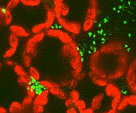Plant Pathology, Department of

Department of Plant Pathology: Faculty Publications
Document Type
Article
Date of this Version
2016
Citation
Jackson-Ziems, T. A. 2016. “Root-Knot Nematodes,” pp. 70-71 in Compendium of Sunflower Diseases and Pests, edited by R. M. Harveson, S. G. Markell, C. C. Block, and T. J. Gulya. St. Paul, MN: APS Press.
Abstract
Root-knot nematodes, Meloidogyne spp., are some of the most damaging plant pathogens. Several of the most common species of root-knot nematodes have been confirmed to reproduce and cause damage on sunflower, including M. arenaria, M. hapla, M. incognita, M. javanica, and M. hispanica.
Meloidogyne spp. occur worldwide but are especially common in temperate, subtropical, and tropical regions. Countries where Meloidogyne spp. have been confirmed to affect sunflower include the United States and the African nations of Egypt, Mozambique, South Africa, and Zambia. Root-knot nematodes tend to cause the most damage to plants grown in sandy soils. Among these species, M. javanica has been shown to reproduce to the highest population density on sunflower.


Comments
Copyright © 2016 The American Phytopathological Society. Used by permission.